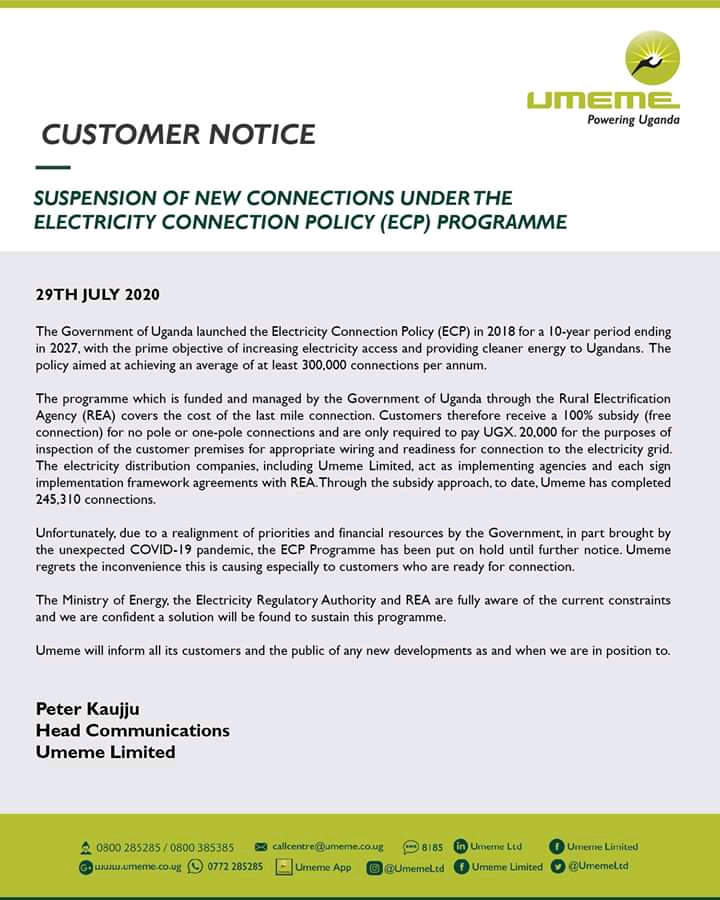Power distribution company, Umeme Limited has suspended the Electricity Connections Policy (ECP) over lack of enough funds to implement it.
This was was revealed in a statement issued on Wednesday July 2020 where Umeme noted thus;
SUSPENSION OF NEW CONNECTIONS UNDER THE ELECTRICITY CONNECTION POLICY (ECP) PROGRAMME
29, JULY, 2020
The Government of Uganda launched the Electricity Connection Policy (ECP) in 2018 for a 10-year period ending in 2027, with the prime objective of increasing electricity access and providing cleaner energy to Ugandans. The policy aimed at achieving an average of at least 300,000 connections per annum.
The programme which is funded and managed by the Government of Uganda through the Rural Electrification Agency (R.) covers the cost of the last mile connection. Customers therefore receive a 100% subsidy (free connection) for no pole or one-pole connections and are only required to pay UGX. 20.000 for the purposes of inspection of the customer premises for appropriate wiring and readiness for connection to the electricity grid.
The electricity distribution companies, including Umeme Limited, act as implementing agencies and each sign implementation framework agreements with R..Through the subsidy approach, to date. Umeme has completed 245.310 connections.
Unfortunately, due to a realignment of priorities and financial resources by government in part brought by the unexpected Covid-19 pandemic, the ECP program has been put on hold until further notice.
The Ministry of Energy , the Electricity Regulatory Authority and REA are fully aware of the current constraints and we are confident a solution will be found to sustain this program.

In 2018 launched ECP a free electricity connection policy where customers were required to pay only shs20,000 for inspection and government caters for the remaining connection fees in a move aimed at connecting 300,000 customers annually implemented by Rural Electrification Agency.
However, according to Umeme, the program has been halted after government ran out of funds.
Umeme however said they will be informing their customers in case of any new developments about the program.
ECP program
The Electricity Connections Policy (ECP) is a 10-year program ending 2027 aimed at increasing access to electricity but also provide clean energy to Ugandans.
As part of the program customers receive a 100% subsidy from government to cover the cost of the last mile connection and customers are only required to pay shs20,000 inspection fees.
At an average of 75 kWh per year, Uganda has one of the lowest electricity consumption per citizen on the continent and according to the ECP program all Ugandans who are within one pole to their premises where the national grid extends are beneficiary to the project.
Government hopes that by taking off the burden of paying to get to the grid, more people will be connected after paying only shs20,000 inspection fees.
According to Umeme, 245310 connections have so far been completed since the launch of the program in 2018.
Last week, the Umeme Managing Director, Selestino Babungi asked government to review the Electricity Connections Policy.
Last month, Umeme said there were pausing connections under the Electricity Connections Policy due to failure by government to pay $25m for 105,412 connections out of the 244,307 target valued at $57m, made by May ,2020.
Makes case for project
The Minister for Energy, Mary Goretti Kitutu recently said it makes no sense to boast of having too much electricity when many people, especially in rural areas, are still living in darkness.
“I am told there is so much power which we are not using. As a minister, this is a big challenge and I warn I will not read such statements that we have too much power when many people are still in darkness,”Kitutu said during the launch of the Electronic Database and Information Management System (EDIMS) by the Rural Electrification Agency early this year.
“One can have a big challenge answering that question on why there is still darkness when we have too much power.”
Government has always boasted of a presence of too much electricity produced by the various dams around the country.
The Electronic Database and Information Management System will help monitor areas that are connected to electricity but also help the ministry with easy access to reliable data for purposes of research and planning.
![]()




























